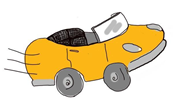Motivation & Mastery
Giulia Forsythe
Motivation
What drives you to do something? What drives learners? Often we expect our learners to share our enthusiasm for a topic and they just don’t seem to muster the same level of excitement. Sometimes they don’t even show up.
Motivation is a complex topic that has been studied in many contexts and has many variables. However, there are a few things you can do to make stronger connections for students to motivate them to learn.

Motivation can determine, direct, and sustain what students do to learn. Consider the acronym WIIFM (what’s in it for me?). You can use WIIFM as a helpful lens to consider your students. After you have ascertained their prior knowledge, you are better able to frame new learning in the context of their experiences and past learning.
Always consider why your learners would be interested in learning something. What is the relevance for them? How will it connect to future activities in this class or beyond?
Extend Activity – What’s In It For Me?

Brainstorm a list of WIIFM (What’s in it for me?) from a student perspective.
See some examples done by previous Extend participants.
If you can’t think of more than “because you should know it,” then you need to talk to your students and get a better sense of where they are in their learning and where they are going.
If you know your students well but you still have a hard time determining the relevance of a particular topic, perhaps you should consider removing this content from your course.
Mastery
One of the most difficult aspects of deconstructing the skills and concepts associated with achieving mastery occurs when dealing with “threshold concepts.” These are often essential concepts in the discipline that must be understood in order to achieve mastery but are extremely challenging because once you fully understand them it is almost impossible to conceive of the topic without them. This is often described as an “expert blind spot.”
If you have an expert blind spot, it’s difficult to break down the concept into its component parts because your thinking has been irrevocably transformed. It’s our role as educators to try and remember what it’s like to be a novice learner.

The book Threshold Concepts and Transformational Learning addresses these concepts, as described by faculty with expertise in several disciplines ranging from economics to electrical engineering, modern languages to mathematics. The scope of these concepts is too great to detail in this module, but we can consider the simple example of learning how to drive a car.
To learn to drive, you require many component skills, including knowing where the gas and brake pedals are and when to use them, how to steer, when and how to use your mirrors, all while following the rules of the road. Experienced drivers find it very difficult to think of each component separately, not as a whole. They drive with a level of automaticity, knowing their reflexes will apply each component as needed.
Learning the component skills to achieve mastery is crucial in any classroom discipline. For example, in economics, physics, or chemistry, the application of a formula can be more easily learned if simple calculations like addition and multiplication have first been mastered so that no cognitive overload occurs. Having the component skills in place allows the learner to focus on the larger conceptual problem.
Extend Activity – Like Driving a Car

Extend Activity – Like Driving a Car
What concept in your discipline is like driving a car? Can you identify the component skills required to master this concept or skill?


